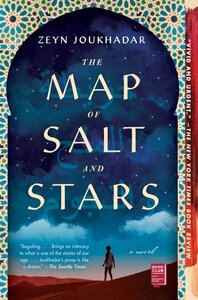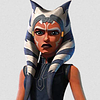Take a photo of a barcode or cover
adventurous
hopeful
tense
fast-paced
Plot or Character Driven:
A mix
Strong character development:
Yes
Loveable characters:
Yes
Diverse cast of characters:
Yes
Flaws of characters a main focus:
No
The Map of Salt and Stars is a story about family, home, adventure, bravery, loss and pain.
In this book we follow two girls:
• Nour: a 12-year old girl who was born in Manhattan but moved to Homs after the death of her father. Because of the war in Syria she has to flee her home (2011).
• Rawiya: a mapmaker apprentice who travels around the Mediterranean with the legendary mapmaker al-Idrisi (around 1150).
Their stories intertwine by the places they travel through on their separate journeys. For Rawiya it’s an expedition around the Mediterranean Sea alongside the mapmaker al-Idrisi who works in commission to Roger II of Sicily. Nour and her family become refugees after their house is bombed and travel through the Middle-East into Northern Africa in search for home.
While Rawiya’s story is historical fiction*, there are definitely fantasy elements weaved into it by the appearance of mythical beasts. Nour’s story is the hard reality of war and loss. Please check the trigger warnings at the end of my review.
The prose in this book is absolutely beautiful. It’s lyrical and it’s colourful because of Nour’s synesthesia (to her letters and numbers, objects, people and voices have colours). The author managed to put words together to form sentences that had me in awe.
The book explores the concept of home and belonging. Where do you belong when your home has been destroyed, you don’t feel a connection to your ancestry and your family is torn apart?
The Map of Salt and Stars tells the story of many (Syrian) refugees and displaced people. I am incredibly grateful this book exists and that I decided to read it on a whim. It had me enthralled from the beginning until the end for both POV’s.
*Both al-Idrisi and Roger II were real people and al-Idrisi did indeed make a Mappa mundi.
TW: death of a loved one, sexual assault, attempted rape.
In this book we follow two girls:
• Nour: a 12-year old girl who was born in Manhattan but moved to Homs after the death of her father. Because of the war in Syria she has to flee her home (2011).
• Rawiya: a mapmaker apprentice who travels around the Mediterranean with the legendary mapmaker al-Idrisi (around 1150).
Their stories intertwine by the places they travel through on their separate journeys. For Rawiya it’s an expedition around the Mediterranean Sea alongside the mapmaker al-Idrisi who works in commission to Roger II of Sicily. Nour and her family become refugees after their house is bombed and travel through the Middle-East into Northern Africa in search for home.
While Rawiya’s story is historical fiction*, there are definitely fantasy elements weaved into it by the appearance of mythical beasts. Nour’s story is the hard reality of war and loss. Please check the trigger warnings at the end of my review.
“Things change too much. We’ve always got to fix the map, change the borders of ourselves”.
The prose in this book is absolutely beautiful. It’s lyrical and it’s colourful because of Nour’s synesthesia (to her letters and numbers, objects, people and voices have colours). The author managed to put words together to form sentences that had me in awe.
The book explores the concept of home and belonging. Where do you belong when your home has been destroyed, you don’t feel a connection to your ancestry and your family is torn apart?
The Map of Salt and Stars tells the story of many (Syrian) refugees and displaced people. I am incredibly grateful this book exists and that I decided to read it on a whim. It had me enthralled from the beginning until the end for both POV’s.
*Both al-Idrisi and Roger II were real people and al-Idrisi did indeed make a Mappa mundi.
“The world is ripping apart, I think, leaving pain to spread like blood through Huda’s bandages”.
TW: death of a loved one, sexual assault, attempted rape.
I bought this book years ago and finally read it. This is a story everyone needs to read, the detail between the historic story and modern turmoil is gut wrenching and so good.
4.75 colorful stars! This book is sometimes overly descriptive but beautiful and lyrical. I’m sad it’s over and it has left me wanting to read more about Syria, Libya or Ceuta.
adventurous
challenging
emotional
hopeful
informative
inspiring
sad
tense
slow-paced
Plot or Character Driven:
Character
Strong character development:
Yes
Loveable characters:
Yes
Diverse cast of characters:
Yes
Flaws of characters a main focus:
No
challenging
emotional
hopeful
reflective
sad
slow-paced
Plot or Character Driven:
Plot
Strong character development:
Yes
Loveable characters:
Yes
Diverse cast of characters:
Yes
Flaws of characters a main focus:
No
Beautifully written, reflective and emotional. Handled such a heavy topic with such care and empathy and didn’t sensationalize the tragic events (side-eyeing The Tortilla Curtain hard). You could tell the author had a lot of love for these characters. I loved reading this. It made me cry a lot. The parallel storytelling worked well. 8/10 would read again.
Graphic: Death, Grief, War
Moderate: Rape, Sexual assault
I listened to the audio version of this book, but still the first thing I want to say is that the cover is just gorgeous. It feels tragic, magical and mystical and that's the right feel for this book.
Listening to this, going through Nour's and Rawiya's stories, hearing about Syria, about all they endured, and about their searches for home, wasn't easy. Because there was pain and because there was grief and darkness but then there was also light and stars and hope.
I don't know how to describe the writing. Saying it was beautiful is not enough. Listening to this was like listening to a poem or maybe a piece of music. I think the writing alone is enough for reading this book even if you don't have a soft spot for "Stars" and "Stories".
Listening to this, going through Nour's and Rawiya's stories, hearing about Syria, about all they endured, and about their searches for home, wasn't easy. Because there was pain and because there was grief and darkness but then there was also light and stars and hope.
I don't know how to describe the writing. Saying it was beautiful is not enough. Listening to this was like listening to a poem or maybe a piece of music. I think the writing alone is enough for reading this book even if you don't have a soft spot for "Stars" and "Stories".
I want to like this book. I really do. The storyline mirroring an old folk story to a modern family's escape from the Syrian war, the clever back and forth, the topic itself shining a light on the refugee crisis...
And yet. The execution was cliched and saccharine, with our twelve year old narrator constantly pondering the ways of life, which makes sense given what she is going through but comes across.. eh.
And yet. The execution was cliched and saccharine, with our twelve year old narrator constantly pondering the ways of life, which makes sense given what she is going through but comes across.. eh.
The writing is so vivid. By using the young narrator's synesthesia to describe the settings, the framework is like nothing I've ever read.
This story is beautiful and devastating and hopeful and enlightening. Exploration of grief and culture and an immigrant's experience -- especially that of the 12-year-old narrator, Nour, who has no memories of her country of origin. The Syrian language isn't even her first language.
This is then followed by a refugee experience. When Nour's home is destroyed by a bomb, she and her sisters and their mother rush to escape Syria.
Reading stories like this are important. And there are so many powerful passages as the story unfolds: "He opens his palm, feeling the heft of the mended knife as though being broken isn't something that destroys you."
It doesn't take much exposure to empathize or sympathize with a refugee when you engage with stories like this; when you see others as human.
This book is a must-read.
This story is beautiful and devastating and hopeful and enlightening. Exploration of grief and culture and an immigrant's experience -- especially that of the 12-year-old narrator, Nour, who has no memories of her country of origin. The Syrian language isn't even her first language.
This is then followed by a refugee experience. When Nour's home is destroyed by a bomb, she and her sisters and their mother rush to escape Syria.
Reading stories like this are important. And there are so many powerful passages as the story unfolds: "He opens his palm, feeling the heft of the mended knife as though being broken isn't something that destroys you."
It doesn't take much exposure to empathize or sympathize with a refugee when you engage with stories like this; when you see others as human.
This book is a must-read.
This was a lovely mix of lots of genres. Historical mapmaking, contemporary refugee crisis, a dash of fantasy elements thrown in - it was one of the few dual-timeline books I can think of that I’ve thoroughly enjoyed, perhaps because of the specific location connections they shared.





